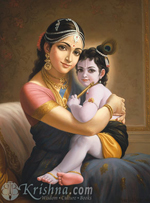
Most women think that their lives as mothers demand endless sacrifices on behalf of their children. And they do. But what if you were destined to give birth to a manifestation of God Himself? What kind of sacrifice would be required then? Let’s find out by hearing the story of a princess named Devaki.
Once the world was overburdened by the military forces of different kings who were demoniac in nature which means they were intent on preying upon or destroying others but were posing themselves as the royal order. The primary duty of kings is to look after the welfare of the people. At that time, the whole world became disturbed, and the goddess of the earth, known as Bhumi, went to see Brahma, the creator of life within the material universe, to tell of her misfortune due to self-aggrandizing kings and leaders.
Bhumi assumed the shape of a cow and presented herself before Brahma with tears in her eyes. She was bereaved and weeping which invoked Brahma’s compassion. She related the unfortunate circumstance of the earth and after hearing this, Brahma became much aggrieved, and he at once started for the ocean of milk where Lord Vishnu, God who pervades everything, resides. Brahma was accompanied by all the lesser gods headed by Shiva, and Bhumi also followed. Arriving on the shore of the milk ocean, Brahma began to pray to Lord Vishnu. Brahma could understand the message transmitted by Lord Vishnu through his heart and he revealed it to the gods for their immediate response.
The message was that God Himself would appear on the earth very soon along with His supremely powerful energies and associates. As long as He remained on the earth planet to execute His mission of annihilating those of ill intent and protecting those of good intent, the gods should also appear there to assist Him in the execution of His mission.. They should immediately take birth in the family of the Yadu dynasty wherein the Lord would also appear in due course of time. The Supreme Godhead Himself, Krishna, would personally appear as the son of Vasudev.
Vasudev married Devaki, the daughter of King Ugrasen and the sister of Kamsa. On their wedding day, Kamsa presented them with a golden chariot and then mounted the chariot to drive them to their new home. On the way, a voice from the sky spoke to Kamsa, saying, "O Kamsa, the eighth son born of Devaki will certainly kill you." Hearing this, Kamsa became furious. He grabbed Devaki by the hair and raised his sword to cut off her head and end her life. Pleading with Kamsa not to kill her, Vasudev said that the eighth child had been predicted as his slayer and that he would hand over all the children to him as soon as they were born.
Kamsa flew into a rage and immediately had Vasudev and Devaki chained and imprisoned and placed under guard. The first son born to Devaki and Vasudev was Kirtiman. One day, a celestial sage from the higher realms named Narada visited Kamsa and told him that the members of the Yadu dynasty who were his relatives and friends were mostly gods who had taken birth to assist Vishnu who was also due to be born in this family, in relieving the burden of the earth from negative forces. Narada also informed Kamsa that Kamsa himself was the incarnation of the demon Kalanemi in a previous life and that he was killed by Vishnu in that lifetime. Now, in this life, Vishnu would take birth in the womb of Devaki and would once again kill him. This only increased Kamsa’s paranoia. So, to be safe, Kamsa had their first-born son, Kirtiman, put to death. He then killed every subsequent child born to Devaki.
Historically upon this earth, power-hungry kings and queens have killed their own father, mother, brothers, sisters and relatives to carry out their avaricious ends. True to his demoniac character, Kamsa then imprisoned his own father, King Ugrasen and usurped his throne.
Each year thereafter, in due course of time, Devaki gave birth to a child. Thus she gave birth to six male children and Kamsa, thinking each of the babies to be the incarnation of Vishnu, killed them one after another. Kamsa was particularly afraid of the eighth child, but after the visit of Narada, he came to the conclusion that any child might be Krishna. Therefore it was better to kill all the babies who took birth from the womb of Devaki. Devaki’s seventh child, a boy who was the only other incarnation of Vishnu among her children, was removed from her womb and placed in the womb of Rohini, another wife of Vasudev, where he grew to term and had a healthy birth.
At that time, Krishna first situated His divine essence in the pure heart of Vasudev, which was then transferred to the loving heart of Devaki. Like all incarnations of Vishnu, He was not put into the womb of Devaki by seminal discharge. The Supreme Person, by His inconceivable potency, can appear in any way He chooses. It is not necessary for Him to appear according to human laws of impregnation and birth. According to yoga philosophy, there are five methods of impregnation in the material universe. They are thought, word, sight, touch, and physical intercourse. Humans are only familiar with the last one. Virgin birth represents the birth of the spiritual man out of the animal. The impregnation takes place through the heart and not through the vagina.
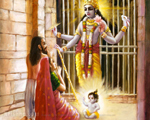
At the time of Krishna’s appearance, there was an atmosphere of peace and prosperity everywhere. There were auspicious stars visible in the sky. In all towns, villages and pasturing grounds as well as within the minds of the people, there were signs of good fortune. The rivers were filled with water and lakes were beautifully decorated with lotus flowers. The forests were populated with beautiful birds and peacocks. All the birds within the forests began to sing with sweet voices and the peacocks began to dance along with their mates. The wind blew very pleasantly, carrying the aroma of different flowers, and the sensation of bodily touch was very pleasing. At home, the brahmans, who were accustomed to offering sacrifices in the sacred fire, found their homes very pleasant for offerings. Due to disturbances created by the destructive kings, the sacred fires and sacrificial performances had been almost stopped in the houses of brahmans, but now they could find the opportunity to offer the sacred ceremonies and sacrifices peacefully. At the point of Krishna’s appearance, the brahmans were filled with joy because they could hear transcendental sounds in the sky proclaiming the appearance of the Supreme Personality of Godhead.
The great sages and the gods (angels), being pleased, began to shower flowers. At the seashore there was the sound of mild waves, and above the sea there were clouds in the sky which began to thunder very pleasingly. When things were arranged in this manner, Lord Vishnu, who is residing within the heart of every living being, appeared around midnight in front of Devaki and Vasudev. Vishnu said, “I know you are very concerned about Me and afraid of Kamsa. Therefore I request that you take Me immediately to Gokul and exchange Me with the daughter who has just been born to the cowherd queen, Yashoda.” Having spoken thus to His father and mother, the Lord turned Himself into an ordinary child in their presence and remained silent.
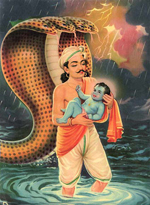
Being ordered by the Supreme Personality of Godhead, Vasudev prepared to take his son from the delivery room, and exactly at that time, a daughter was born to King Nanda and Queen Yashoda, a cowherd family living in Gokul. The child was the personification of yoga-maya, the internal, spiritual potency of the Lord. By the influence of this divine, internal potency, all the residents of Kamsa’s palace were overwhelmed with deep sleep, and all the palace doors opened although they were barred and shackled with iron chains. The night was very dark, but as soon as Vasudev took Krishna in his arms and went out, he could see everything just as in the sunlight. When Vasudev was carrying Krishna the darkness of the night disappeared. At the same time there was thunder in the sky and severe rainfall. Vasudev arrived at the bank of the Yamuna River and saw that the water of the Yamuna was roaring with waves and that the whole span roiled with white water. Though churning furiously, the river gave way and parted for Vasudev. Reaching the other side, he went to the place of Nanda in Gokul where he saw that all the cowherd residents were fast asleep. Silently, he entered the house of Yashoda and Nanda and, without difficulty, he exchanged his son with the newly born baby girl. Then he returned to the prison and silently put the girl on the lap of Devaki. He again clamped the shackles on himself so that Kamsa could not discover what had happened.
Mother Yashoda understood that a child had been born to her but because she was very tired from the labor of childbirth, she had fallen asleep. When she awoke, she could not remember whether she had given birth to a male or a female child.
Kamsa’s guards awoke and heard the newborn child crying. Kamsa was waiting to hear the news of the child’s birth and the guards immediately informed him that the child had been born. At that time, Kamsa got up from his bed very quickly and exclaimed, “Now the cruel death of my life is born!” Kamsa became perplexed now that his death was approaching. Immediately he proceeded toward the place where the child had been born.
Devaki, on seeing her brother approaching, prayed in a very meek attitude to Kamsa: “My dear brother, please do not kill this female child. I promise that this child will be wed to your son. Please don’t kill her. You are not to be killed by a female child. The prophecy said you are to be killed by a male child, so please do not kill her.”
Kamsa was so cruel that he did not listen to the pitiful prayers of his sister, Devaki. He forcibly grabbed the newborn child to rebuke his sister and attempted to mercilessly dash her upon the stone. But instantly the child slipped out of his hands, rose into the sky and appeared with eight arms as the goddess Durga. She was decorated with beautiful garments, flower garlands and ornaments. In her eight hands she held a bow, lance, arrows, sword, conch shell, disc, club and shield. From above, the goddess addressed Kamsa,
“You demon, how can you kill me? The child who will kill you is already born before me somewhere else in this world. Don’t be so cruel to your poor sister, Devaki.” Having warned Kamsa, Durga then disappeared. After hearing these words, Kamsa became overwhelmed with fear. Out of pity for himself and not his sister, he immediately released Vasudev and Devaki from prison. That is the story of the birth of Krishna, some 5000 years ago in what is now called India.
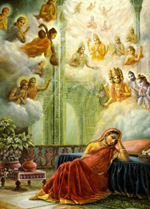
Let us look at the Devaki archetype and how it plays out in our contemporary world. Firstly, the birth of Krishna is a classical mythological motif — birth followed by separation from one or both parents or being cast out of one’s homeland under the threat of death. Here, an otherwise gentle and loving mother is forced by circumstance to abandon her child soon after its birth. The Devaki archetype is ubiquitous in our modern world to the extent that so many women give up, abandon or lose their children after their births. The reason may be that she is unwed or a child is economically unfeasible or even that she has agreed to become a surrogate mother, contractually bound to give birth to someone’s else’s baby. Under the influence of the Iron Age of Kali (please refer to the article entitled, “The Cow, the Bull and the False King.”), women routinely abort, give away or get rid of their babies due to inconvenience. Further, as prison populations rise, so does the number of female inmates and the subsequent birth of children in prisons.
Separation from one’s newborn child at birth may be regarded as fortunate or unfortunate by the mother, depending on the circumstance. But through the eyes of a child, abandonment or rejection never feels like a blessing. In Devaki’s case, not only is she separated from her newborn child, the child is none other than God Himself in the form of Krishna. Vasudev and Devaki were so blessed due to their virtuous actions in previous lifetimes that they were awarded the parenthood of God Himself. However, their divine favor did not include their being able to raise Him as their son in their own home. This blessing fell upon the virtuous Nanda and Yashoda. Nanda and Yashoda did not receive the blessing of God being born in their family but they were given the task of parenting Him from birth to adolescence.
Which would be preferable? It would seem that having your child taken from you at birth in order to protect Him from the tyrannical Kamsa would be deeply disappointing for Devaki and Vasudev. On the other hand, this was one of only three children that were actually saved from death out of the nine children to come from her womb which would have delivered a strange sense of jubilation in such an unusual circumstance. Furthermore, who can understand the inconceivable blessings and elevation of such souls who are hand picked to participate in the lila or pastimes of God Himself when He appears on earth? Most of us humans cannot.
The archetype of Devaki also points out the plight of a mother who fails to meet the needs of her child, particularly the emotional needs, but not necessarily through any fault of her own. Sometimes fate determines that a woman is meant to bring a soul into the world and the relationship ends there. Like Devaki, she may feel a sense of inadequacy or non-fulfillment of responsibility since she does not get the opportunity to care for the child throughout its childhood. This is especially true for women who put their child up for adoption. But it is rarely a mistake that we may be chosen to bring a child into the world and at the same time, be deprived or deprive ourselves of the opportunity to raise the child. Karmically, a soul may need to experience the set of circumstances and lessons that come from being raised by his mother or he may need to experience a different set of circumstances and lessons which stem from being abandoned by or separated from his mother. Which is preferable? Arguably, being raised by his mother. But that may not be the best situation for that particular soul at that particular moment in its evolutionary journey. Therefore, to judge or second guess people and circumstances especially when seen with human eyes clouded with the dust of prejudice and preconception is human folly, not divine vision.
With human eyes, we look upon the horror of Devaki giving birth to six children and then being forced to witness their horrendous homicides as they are dashed upon the stone by her barbarous brother while she is powerless to act. However, it is explained in the Vedas that the first six sons born to Devaki were actually the children of Kamsa in two of his previous lives, one as the demon Kalanemi and the other as the demon Hiranya Kashipu. In that life, his sons went behind his back in an effort to gain a boon from Brahma which would make them immortal and invincible. Since that would have given them greater power than their father, he cursed them. Being a demon which means that he is envious in nature, he chose to teach them a lesson about their so-called invincibility in this current life. He promised that he would personally put each of them to death which is exactly what he did.
This also points out an archetypal situation wherein a woman finds herself in a quandary with regard to an abusive family member or mate who torments, beats or murders her children. Here, Devaki’s brother, Kamsa, killed each of her children and there was nothing she could do about it. Firstly, she was imprisoned and secondly, she could not go to any authority and seek justice since her brother was the highest authority in the land, having usurped the throne from their father whom he had also imprisoned. She was truly powerless. But what is to be said about women whose children are abused by a family member who do nothing to remedy or change the circumstance? They fail to offer protection to those children. Sometimes they do not rescue their children out of fear or threat from the abuser. Other times they fail to act in the best interests of their children because they don’t want to drive away their lover. Living without a mate or without love is more unbearable for them than watching their children being abused.

One would think that being chosen to be the mother of God would be the highest honor bestowed upon a conditioned soul within the material world. What could possibly be a greater honor? Though that may be true, it does not mean that it is an easy or even a welcomed task. In this case, Devaki had to endure witnessing the death of six of her innocent children at the hands of an irrational madman with no reasonable explanation. None of those children had been predicted to be Kamsa’s potential killer. In the case of the virgin, Mary, in Christian theology, she too had to witness the torture and crucifixion of her beloved son to satisfy the demands of a frenzied mob. In this case as well, it is seemingly a painful and thankless task to give birth to an avatar, a divine incarnation empowered to carry out a specific purpose.
This also illustrates an archetypal motif wherein a woman believes she has given birth to a gifted, special, superhuman or divine child. And subsequently, she overindulges the child or projects upon him all her most lofty notions or unrealized dreams and thereby expects him to carry the burden of realizing her own sense of higher purpose and to fulfill her romanticized ideal of having given birth to a genius or a messiah. Such a woman often sees herself and her offspring as misunderstood, isolated, alienated or persecuted. It may fulfill or play out her need to feel victimized by those who don’t recognize the true purpose or identity of she and her child. Or she may view her life as a sacrifice for the realization of a higher purpose with regard to she and her child and willingly become a martyr to this higher goal. Though this is not the case with Devaki, it does illustrate its shadow opposite.
Devaki assumes the role of a martyred mother since she goes through the difficulty of pregnancy and childbirth without the joy and reward of raising and nurturing her children. In fact she not only loses Krishna to the care and safety of Nanda and Yashoda, she also loses her previous seven children to the paranoia and cruelty of her wicked brother, Kamsa. Motherhood for Devaki is a series of seemingly superhuman sacrifices without the most basic, expected rewards of motherhood, including the beautiful bond between mother and child. Her self-sacrifice, though noble and praiseworthy, demands the forfeiture of her own happiness. But it is very important to remember that the direct participation in the divine pastimes of a godly being, what to speak of God Himself, has rewards that the vast majority of humans never experience and really know nothing about. Further, it should be pointed out that a soul, such as Devaki, must be a liberated soul to begin with in order to even qualify for such a wonderful role as divine mother. A soul of this magnitude will never again be subjected to the dualities of material life or of repeated birth and death. She will ever look upon the gentle face of God in a divine, personal, loving exchange with the very source of her being. This indeed, is transcendental consolation and compensation.
From a human perspective, Devaki is nonetheless required to learn and practice detachment or letting go. Any ordinary woman could become permanently overwrought with the loss of one child, what to speak of eight. Devaki had to disidentify with or detach herself from these overwhelming losses. She apparently maintained a favorable attitude and managed to keep her wits about her. In addition, as a confirmation of her truly divine nature, she displayed an incomprehensible attitude of forgiveness toward her brother, Kamsa, who repeatedly committed these horrible atrocities at her expense.
In this day of increased incest in our society, it makes one wonder which act would be the lesser evil perpetrated by one’s own brother — the sexual abuse of his sister or the murder of her children? The Vedas explain that prior to the Iron Age which is the current age in which we live, adversaries would only be found outside the family. As virtue waned with the passing of time, opposing
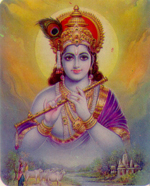
Devaki gave birth to Krishna whose role it was to kill off or overcome the darkness or negative behavior that shackled the family and the world. On one level, this can be compared to a nephew confronting an abusive uncle who is terrorizing the family. From Devaki, we derive inspiration of a divine magnitude. She bore her burden stoically and played her role faithfully. She exhibited strength and composure that human mothers would do well to emulate. And maybe then, you too may qualify yourself to give birth to a god or divine being.